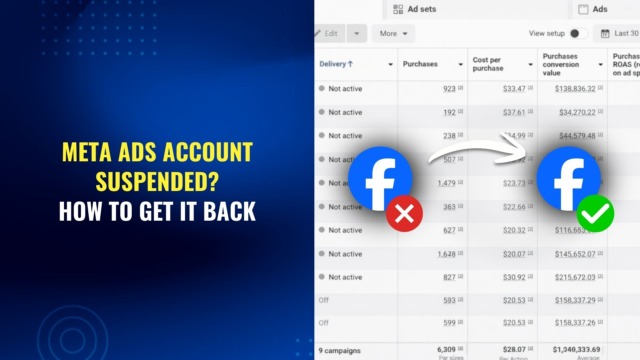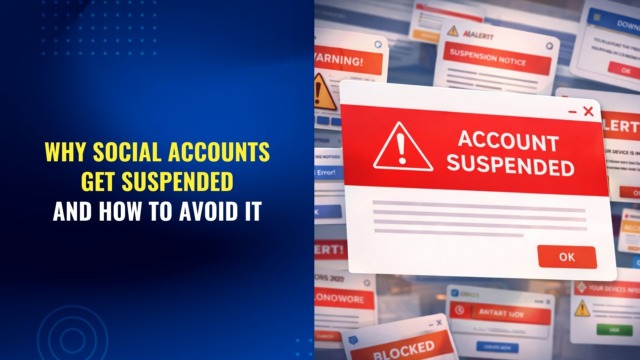
Book a FREE 15-minute consultation with an expert – Book Now
TikTok Shop Copyright Guide for Sellers
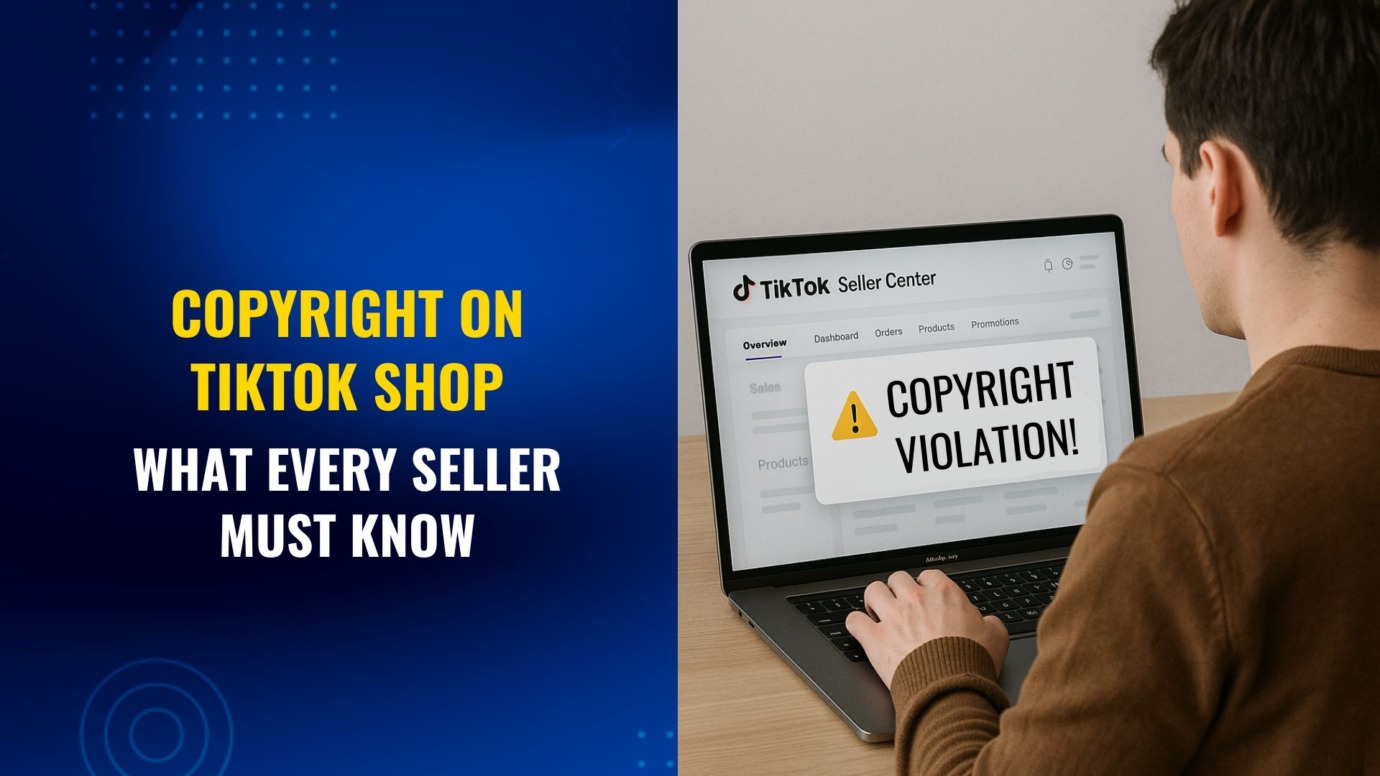
The growth of TikTok Shop has created unprecedented opportunities for e-commerce businesses and content creators to reach millions of potential customers. However, with great opportunity comes great responsibility – particularly when it comes to respecting intellectual property rights.
Copyright laws aren’t just about being compliant; it’s about protecting your business from violations that could result in account termination and legal consequences.
In this article, we will explain the basics of copyright on TikTok so you can create content confidently without worrying about your account being suspended.
The High Stakes of Copyright Compliance
Like Amazon and other e-commerce platforms, TikTok takes intellectual property protection very seriously. The platform’s enforcement data reveals the serious consequences that sellers face when they violate copyright rules.
During the latter half of 2024, TikTok’s comprehensive IP protection system delivered significant results in maintaining marketplace integrity:
- More than 900 seller accounts faced permanent closure due to intellectual property violations
- The platform prevented over 7 million potentially infringing products from entering the marketplace
- Content moderation teams removed approximately 675,000 videos and livestreams that violated IP policies
- Over 16,000 creators lost their selling privileges permanently for policy violations
- TikTok’s IP Protection Centre processed more than 400,000 infringement reports during this period
You need to understand that these aren’t just numbers – they represent real businesses that faced severe consequences for copyright violations. This is why we recommend that you learn the rules, as it can mean the difference between thriving on TikTok Shop and losing your selling privileges entirely.
What Copyright Actually Protects
Copyright protects original creative works, like music, videos, photos, writing, and art. It doesn’t protect the idea itself, only the way you express it. You can’t just copy someone’s exact video, but you can make your own version in your own style. Protection starts the moment you create something; no registration is needed (though registering helps if there’s a dispute over it).
As a rule of thumb, almost everything online is protected unless it explicitly states otherwise.
TikTok rules ban anything that uses someone else’s work without permission. This includes your posts, product images, descriptions, marketing materials, livestreams, and even background music or visuals in your videos.
If it’s not yours or you don’t have the right to use it, don’t post it.
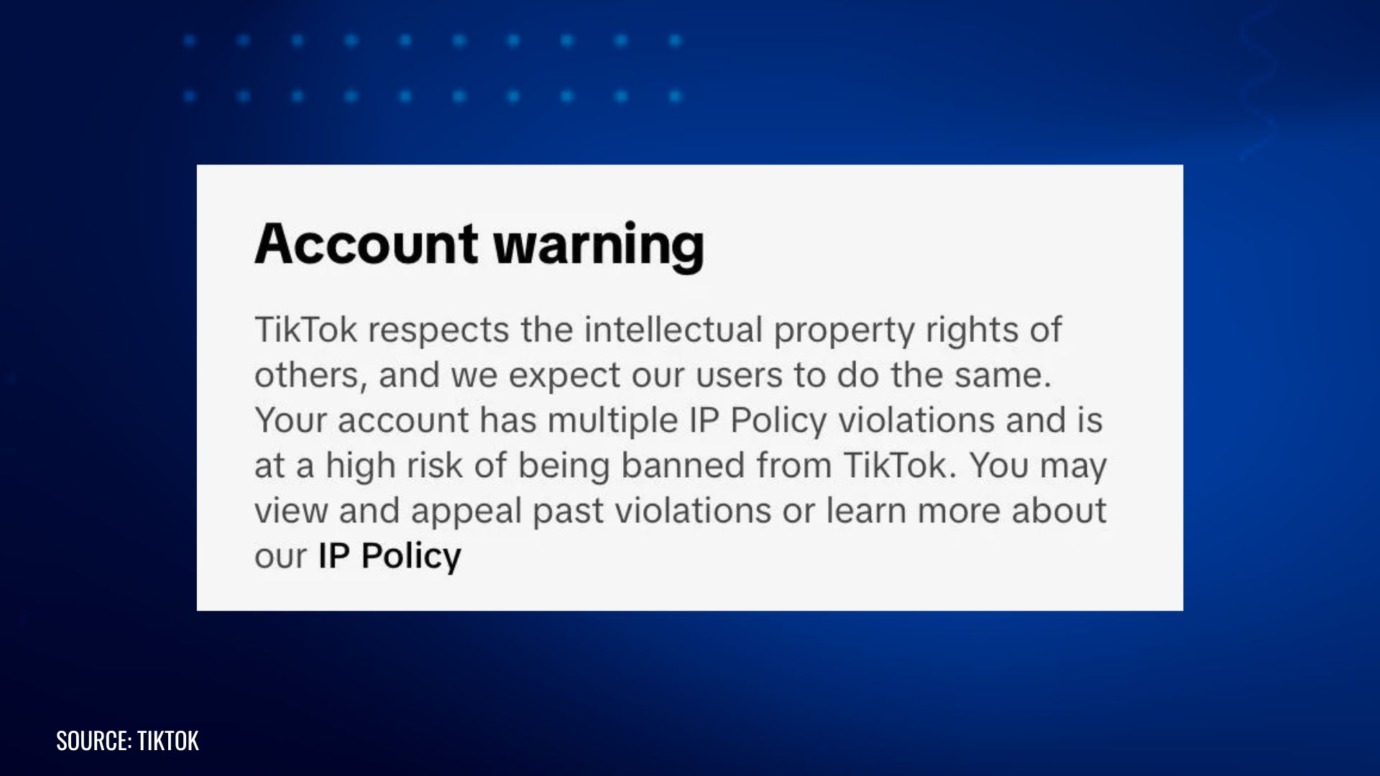
TikTok Point Violation System
One way TikTok enforces copyright laws on the platform is through a violation point system that assigns penalties ranging from 1 to 48 points depending on the severity of the infringement. These points accumulate over time and reset every 180 days. However, reaching certain thresholds triggers increasingly severe and permanent enforcement actions:
At 12 violation points: Loss of access to campaigns and promotional opportunities
At 24 violation points: Reduced livestream traffic and blocked new product listings for 14 days
At 36 violation points: Extended restrictions on platform benefits and affiliate program participation
At 48 violation points: Permanent shop removal and account termination
The severity of copyright violations can result in immediate account suspension regardless of your current violation point total, making prevention absolutely critical.
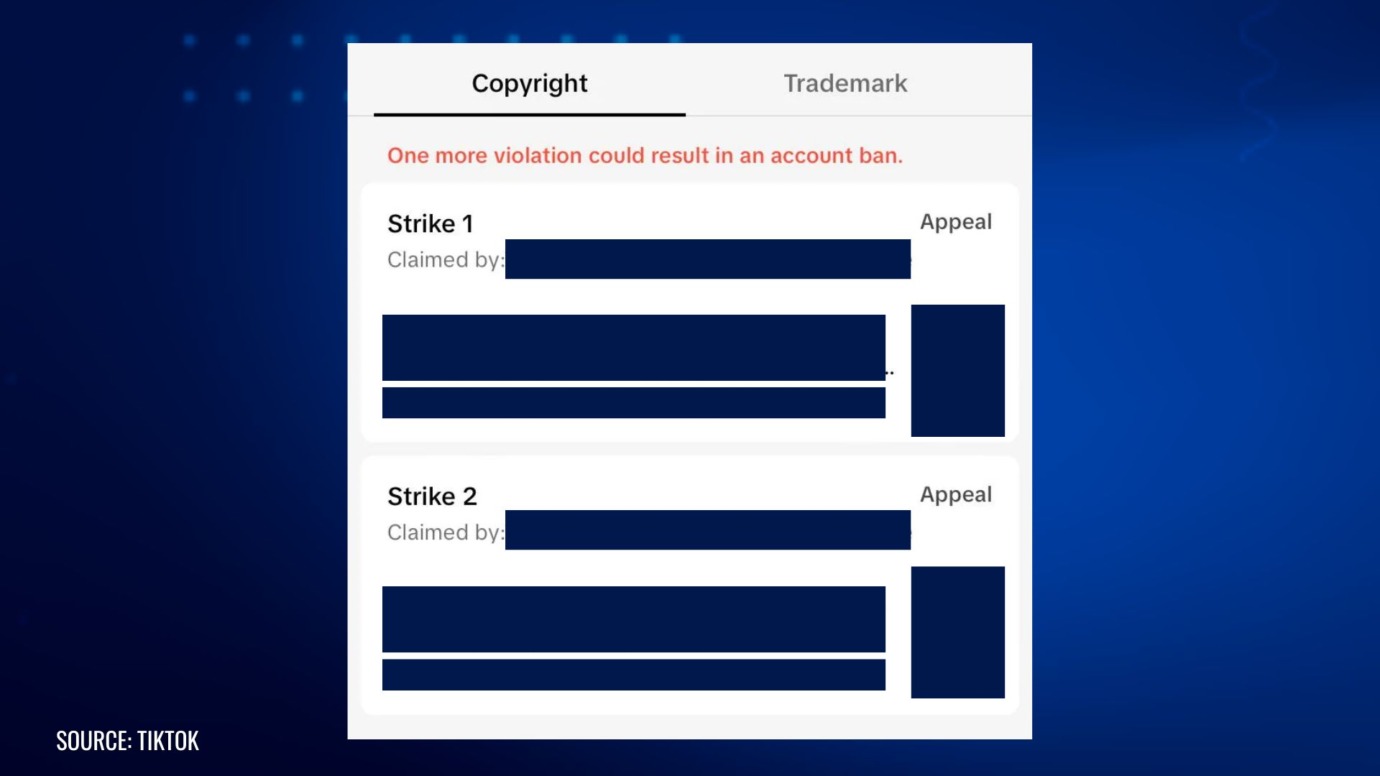
Copyright Rules for TikTok Shop Sellers
On TikTok Shop, your content is directly linked to selling products. This makes it a commercial use, which is subject to stricter copyright rules than regular TikTok content. In most cases, you cannot use copyrighted material without permission.
Safe Content Options:
- Create your own content
- Use licensed materials you have explicit permission to use for commercial use
- Use official brand-provided assets for the products you sell, and make sure you have permission to use them, ideally with written documentation from the brand.
Why this matters:
Relying on copyright exceptions (like fair use) is risky in a selling context and is rarely a valid defense. If you use copyrighted materials without proper permission, TikTok Shop may:
- Remove your content
- Apply account penalties
- Suspend your seller account
Bottom line: Always use original, licensed, or brand-approved content to avoid violations.
Best Practices for Copyright Compliance
Create Original Content: The safest approach is to use only content you’ve created yourself or content you own the rights to. When you create original product photos, videos, and descriptions, you maintain full control over your intellectual property.
Obtain Proper Authorization: Before using any third-party content, secure written permission from the copyright holder. This includes images, music, video clips, and any other creative materials. Keep documentation of these permissions readily accessible.
Verify Supplier Authorization: When working with suppliers, ensure they’re authorized to distribute the products they’re providing. TikTok recommends preparing documentation including authorization letters from suppliers and copies of intellectual property rights certificates.
Use TikTok’s Approved Resources: For music in your marketing content, use TikTok’s Commercial Music Library, which contains pre-approved tracks for business use. The general music library is intended for personal use only and may not be appropriate for commercial content.
Implement Regular Content Audits: Regularly review your product listings, marketing materials, and promotional content to ensure all elements are properly licensed or original. This proactive approach can prevent violations before they occur.
The DMCA Process and What It Means for Sellers
TikTok complies with the Digital Millennium Copyright Act (DMCA), which provides a framework for addressing copyright infringement claims. When a copyright holder submits a valid DMCA notice, TikTok will remove the alleged infringing content and notify the seller.
If you receive a copyright infringement notification, you have options:
Direct Resolution: Contact the copyright holder directly to resolve the matter, which may be faster and less formal than the platform’s dispute process.
Counter-Notification: If you believe the claim is in error or that you have authorization to use the content, you can file a counter-notification through TikTok’s Seller Center. This must include specific information such as your identity, contact information, a detailed explanation of why the content isn’t infringing, and proof of authorization or ownership. If the owner of the rights believes their claim is valid and your counter-notice is not accurate, they may file a lawsuit.
Appeal Process: TikTok provides an appeals process, but submitting false or misleading information can result in liability for damages under DMCA provisions.
Red Flags That Could Trigger Violations on TikTok
Be particularly cautious of these common copyright dangers:
- Using product images directly from other retailers or brand websites without permission
- Incorporating popular songs, movie clips, or TV show content in promotional materials
- Copying product descriptions, marketing copy, or creative content from competitors
- Using celebrity images or likenesses to promote products without authorization
- Displaying brand logos or trademarks without proper licensing agreements
- Downloading or copying images from the internet without a valid commercial license (for example, stock photos, artwork, or graphics)
Building a Copyright-Compliant Business Strategy
Successful TikTok Shop sellers treat copyright compliance as a core business function rather than an afterthought. This means investing in original content creation, establishing relationships with licensed content providers, and maintaining thorough documentation of all intellectual property permissions.
Consider developing a content creation process that includes copyright clearance as a standard step. Train your team to recognize potential copyright issues and establish protocols for obtaining necessary permissions before content goes live.
Don’t Leave Copyright Compliance to Chance
Copyright compliance on TikTok Shop isn’t just about following rules-it’s about building a sustainable, respected business that can thrive in the long term. The platform’s strict enforcement reflects its commitment to protecting both creators and legitimate businesses from intellectual property theft.
With TikTok’s violation point system and potential for immediate account termination, the cost of copyright infringement far outweighs any perceived short-term benefits of using unauthorized content. By prioritizing original content creation and proper licensing, you’re not just protecting your business from violations-you’re building a brand that customers and partners can trust.
Remember: when in doubt about copyright issues, consult with a qualified social media attorney. TikTok cannot provide legal advice, and copyright law varies by jurisdiction. Investing in proper legal guidance upfront can save your business from costly violations.
Legal Disclaimer: The articles published on our platform are for informational purposes only and do not constitute legal advice in any form. They are not intended to be a substitute for professional legal counsel. For any legal matters, it is essential to consult with us or a qualified attorney who can provide advice tailored to your specific situation. Reliance on any information provided in these articles is solely at your own risk.
Amazon Brand Registry – Discover for Free if You’re Eligible
Increase Your Chance of Getting a
Trademark to 96%
Subscribe to Our Newsletter
Sign up to receive valuable information on E-Commerce and intellectual property
